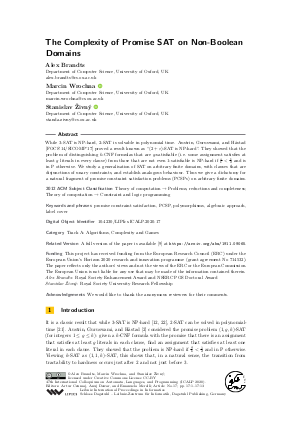@InProceedings{brandts_et_al:LIPIcs.ICALP.2020.17,
author = {Brandts, Alex and Wrochna, Marcin and \v{Z}ivn\'{y}, Stanislav},
title = {{The Complexity of Promise SAT on Non-Boolean Domains}},
booktitle = {47th International Colloquium on Automata, Languages, and Programming (ICALP 2020)},
pages = {17:1--17:13},
series = {Leibniz International Proceedings in Informatics (LIPIcs)},
ISBN = {978-3-95977-138-2},
ISSN = {1868-8969},
year = {2020},
volume = {168},
editor = {Czumaj, Artur and Dawar, Anuj and Merelli, Emanuela},
publisher = {Schloss Dagstuhl -- Leibniz-Zentrum f{\"u}r Informatik},
address = {Dagstuhl, Germany},
URL = {https://drops-dev.dagstuhl.de/entities/document/10.4230/LIPIcs.ICALP.2020.17},
URN = {urn:nbn:de:0030-drops-124241},
doi = {10.4230/LIPIcs.ICALP.2020.17},
annote = {Keywords: promise constraint satisfaction, PCSP, polymorphisms, algebraic approach, label cover}
}

 Creative Commons Attribution 3.0 Unported license
Creative Commons Attribution 3.0 Unported license
